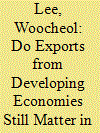| Srl | Item |
| 1 |
ID:
188447


|
|
|
|
|
| Summary/Abstract |
Amid ever-growing global value chains (GVCs), a major controversial topic relates to the extent to which developing economies benefit from participating in such value chains. To measure these gains, this paper examines data pertaining to value-added in exports from three Southeast Asian economies—Malaysia, Thailand and Vietnam. The study estimates the sectoral income elasticities of the export demand of each country over the period 1980–2017, revealing that the highest income elasticities are observed in low value-adding sectors such as primary products, resource-based goods and low-tech industries. This implies that the three countries have been involved in simple and not high-skill tasks within GVCs. The paper also examines the sectoral domestic share of value-added (DVA) and foreign share of value-added (FVA) of exports of the three economies using the OECD Trade in Value-added (TiVA) database over the period 2005–15. We find that DVA in the medium- and high-tech industries that add greater value is smaller than FVA in all three countries. Overall, these results suggest that developing nations need to step up their participation in GVCs through process and/or function upgrading.
|
|
|
|
|
|
|
|
|
|
|
|
|
|
|
|
| 2 |
ID:
171826


|
|
|
|
|
| Summary/Abstract |
This paper revisits the validity of the weak currency policy in Vietnam. It estimates the income and exchange rate elasticities of Vietnam’s bilateral export and import demand with its twenty-three trading partners between 1994 and 2016. The Fully Modified OLS (FMOLS) estimates suggest that the income elasticities of both export and import demand are consistently significant and more elastic with expected positive signs. Meanwhile, the exchange rate elasticities are inconsistent in terms of their size, sign and statistical significance. In general, bilateral import demand, compared to bilateral export demand, shows considerably inelastic exchange rate elasticity with signs that are opposite to expectation. Only three countries satisfy the Marshall-Lerner condition. Also, the influence of income over trade balance outweighs that of exchange rate. The weak currency policy that was once claimed to be effective is now ineffective in Vietnam as the country’s external sector is dominated by foreign-invested enterprises.
|
|
|
|
|
|
|
|
|
|
|
|
|
|
|
|